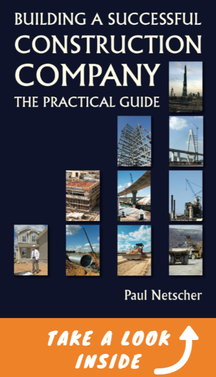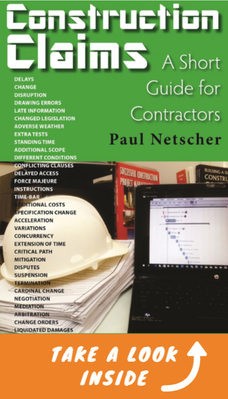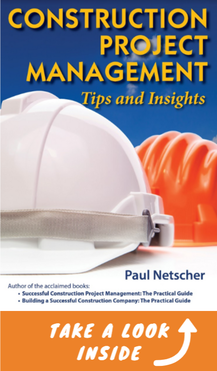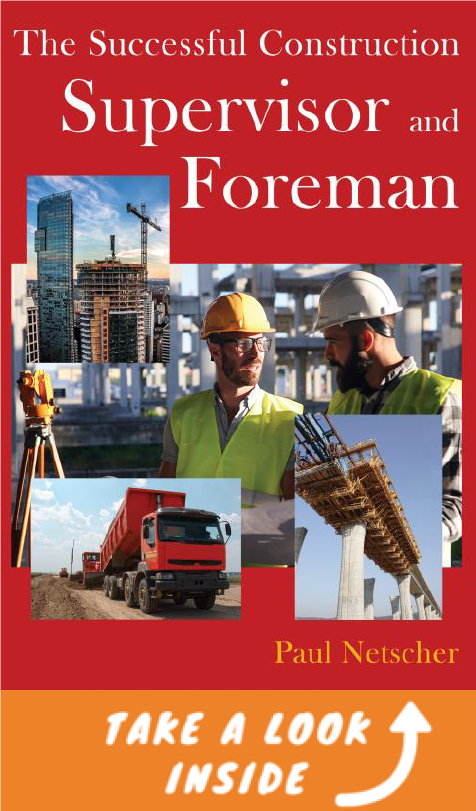|
Great excitement – you have just been awarded a new construction project. Then elation fades as reality sinks in. You have to construct that project, do that work, for that price, under those project conditions, in that time frame and for that client. Who was the idiot who priced the job? Maybe it takes a while for the reality to hit home. Sometimes several months into the project before the bad news starts filtering back to management at Head Office. Even then they probably don’t want to hear the truth, rather hoping things will get better, or blaming the incompetent project team. Over the last few weeks we considered reasons why construction projects aren’t successful. We looked at the role of the client (How can clients ensure their projects meet their expectations?), the impact of the design team (How designers can make construction projects more successful), the client’s project manager (How can the owner’s Project Manager ensure the success of their construction project ), the tender or pricing (bid) documentation (Why construction projects go wrong before they even start – what should owners do?) and the selection and adjudication of the contractors' prices (Why owners sometimes employ the wrong contractor). But all of this can be in place and yet, the construction project is doomed to failure before it starts. Yes, the contractor has messed up (there are a few other choice phrases you could use here) their price. Why? What could have been done differently? Where did it go wrong? You received the project pricing documents what happens now?You receive your tender (bid) documents – what now? Believe it or not the pricing process sometimes fails before it even begins. 1. Check the project pricing documents are complete. Are all the pages and drawings included? Missing information could mean you don’t allow for, or price, certain items. 2. Read the document. Fairly basic, but this often doesn’t happen! Are all the contract conditions acceptable? Some owners apportion unreasonable risks or impose unacceptable contract conditions on their contractors. 3. Understand the basis of the contract – lump sum, design and construct, remeasurable? 4. Understand the contract document. Is the scope of work clear? Are the requirements and specifications ones you would normally expect? Are there contradictory clauses? Is the information complete? Don’t start construction projects without a proper contract 5. Understand the client. Is it someone that you want to work for? Will they be able to pay you? In construction it’s important to know your clients. It could save you 6. Can you provide the deliverables requested by the client, such as; insurances, sureties (bonds), etc.? Does your company have the required registrations to build the project? 7. Do you have an experienced person to price the construction project, who understands how similar projects are constructed in that location? 8. Of course make sure you note when and where the price must be submitted and what needs to be included. How many contractors put in effort in pricing a project, only for it not to be considered because it didn’t meet the requirements? #constructionpricing #constructionprojects #constructionmanagementtips Pricing the construction project There are obviously many different ways and systems for pricing construction projects but I’m not going to dwell on them here, except to say make sure you are using methods appropriate to the project, ones your estimator is familiar with and that will provide a reliable price. 1. You may have to first prepare designs, or measure the project. Sometimes the client has provided a bill of quantities for you to price – this should be checked to ensure its accuracy. 2. Work out the resources required for the project. Do you have the required skills and resources? If not will you be able to acquire them? 3. Prepare a tender schedule (program). Are you able to complete the project in the client’s specified time? The construction project tender or bid schedule 4. Calculate the costs to carry out the project (including material costs, equipment, labour and subcontractor costs). Ensure these costs allow for everything, including; transport, handling, fixings, access, wastage, taxes, etc. 5. Can you comply with the safety and quality requirements? 6. Do all the materials you propose using meet the specifications? 7. Ensure suppliers and subcontractors are provided the relevant documentation and specifications to price. Carefully adjudicate supplier and subcontractor quotations to ensure there are no missed costs and that they can deliver in accordance with your tender schedule. What to include in Subcontractor pricing documentation 8. Visit the project location to ensure you understand the local conditions and anything which could impact the construction costs or time. Don’t Submit Your Construction Price (estimate/tender) Proposal Until You Get These Questions Answered On A Site Visit 9. Calculate the cash flow for the project. Can your company withstand any negative cash flow requirements? Improve cash flow. Implement these strategies when pricing your next project Finalising your price for the project 1. Ensure you understand the project risks. Have you mitigated them, allowed extra costs in case they do happen, or can the project and company survive the risk event should it occur? 2. Have you allowed for the expected weather events? 3. Check all arithmetic calculations. You wouldn’t be the first contractor to make an arithmetic mistake or put a decimal point in the wrong place. 4. Ensure you have priced all of the items. 5. Understand your opposition and how they will price the construction project. 6. Understand currency risks and price escalation over the project duration. Should you allow extra for this? 7. How does your calculated price compare to other similar projects you have constructed? 8. How desperate do you need the construction project? Knowing everything you now know about the construction project do you still want to win it? It’s not too late to withdraw from the project and not submit a price. Don’t let egos get in the way of this decision. Should contractors price every project? Get your price right What I’ve outlined is an oversimplified skeleton. Arriving at the correct contract price takes more than this (for more read; ‘Building a Successful Construction Company: The Practical Guide). However even these simple basic steps are overlooked, and construction companies end up winning a project at the wrong price, or one they don’t have the skills and resources to build, or one for the wrong client, or with cash flows they can’t meet. But what happens after you submit your price can still mean the difference between winning and losing the project. It could still result in you being awarded a project with the wrong price or one with unacceptable contract conditions – Also read; Steps to help you win your next construction project and Construction project bid negotiations – Don’t make a mistake So next time your company wins a project I hope it was priced correctly! "What I personally liked about this book were the case studies; they were great. Also, the proper explanation of every thing talked about." Reader review on Amazon (Written by Paul Netscher the author of the acclaimed books ‘Successful Construction Project Management: The Practical Guide’ and ‘Building a Successful Construction Company: The Practical Guide’. Both books are available in paperback and e-book from Amazon and other retail outlets. To read more on this important topic get your copy of these books today. Read what other have said after reading these books.)
© 2022 This article is not to be reproduced for commercial purposes without written permission from the author. construction management construction project management
10 Comments
sionel abotde
29/6/2015 08:46:56 am
Just to summarize sir,i think we should check every details o the contract and the project up to the small things,also have a background check,tnx
Reply
Paul
30/6/2015 05:11:26 am
Sionel thanks I think you summarised it well.
Reply
Andrew Barley
19/7/2015 07:24:08 am
what is most important is that both parties honor the spirit of the Contract. The price that wins the bid is no longer the lowest price thankfully. clients are more sophisticated and are as interested in the team and what you have to offer.
Reply
Bill
22/7/2015 09:19:10 pm
Excellent article. points that I am sure most estimating departments make every effort possible to account for while in the bid process, but some how for some reason or another a lot of the check list is left unchecked. As a Construction manager with 20 years, I had to laugh at the first paragraph. I could not count how many times I have felt that and especially the last comment. "who was the idiot who priced this job"
Reply
Paul
23/7/2015 02:52:40 am
Thanks for your comments. The poor tenderer always get the blame, even when management has cut the heart out of the bid or the PM messed up on site.
Reply
7/5/2018 07:57:10 am
Hi Paul,
Reply
Paul
7/5/2018 12:46:29 pm
Hello Lefa
Reply
2/4/2019 03:17:26 pm
In your blog the content is so exciting and amazing. You have the best tips for construction management. I am happy to read your best blog
Reply
Paul
2/4/2019 03:32:08 pm
Thanks Peter for your feedback. Please share the link to these articles and the blog page on your facebook page and other social media sites so that we share the knowledge.
Reply
Leave a Reply. |
Archives
June 2024
Note: We welcome genuine comments, especially comments that add additional information to the subject matter in the article. We however reserve the right to remove inappropriate comments, which includes comments that have nothing to do with the subject, comments that include inappropriate language, and comments that are an advertisement for a product or company, or which include an advertising link. Comments must be in English. We will not enter into discussion on why a particular comment was removed.
CategoriesCopyright 2016 - The attached articles cannot be reproduced for commercial purposes without the consent of the author.
The opinions expressed in the attached articles are those of the writer. It should be noted that projects are varied and different laws and restrictions apply which depend on the location of the contractor and the project. It's important that the reader uses the supplied information taking cognisance of their particular circumstances. The writer assumes no responsibility or liability for any loss of any kind arising from the reader using the information or advice contained herein. "I have what I consider some of the best books on construction management."
Books are available from: Amazon.com Amazon.co.uk takealot.com kalahari.com Amazon.in Amazon.de Amazon.fr Amazon.it Amazon.com.au Powell's Fishpond uread bokus Amazon.ca Amazon.es Other retail stores Available in paperback or on Kindle "28 YEARS OF CONSTRUCTION PROJECT MANAGEMENT EXPERIENCE, DEVELOPING SUCCESSFUL CONSTRUCTION PROJECT MANAGERS AND BUILDING SUCCESSFUL CONSTRUCTION COMPANIES"
|







 RSS Feed
RSS Feed




